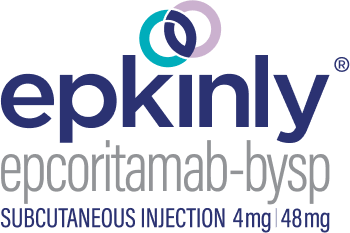Remission is possible
EPKINLY delivers powerful efficacy that can transform uncertainty into hope
The goal of EPKINLY is to help you achieve remission. Learn about the results that were seen in the clinical study with EPKINLY.
EPKINLY is approved based on patient response data. A study is ongoing to confirm the clinical benefit of EPKINLY.
%20desktop.jpg)
MY REASON WHY
Remission is possible
In the clinical study:
Overall
response
61%
EPKINLY helped 61% of patients (90 of 148) achieve complete or partial remission (signs of cancer either disappeared or decreased)
38%
Complete remission
EPKINLY helped 38% of patients (56 of 148) achieve complete remission (signs of cancer disappeared completely)
23%
Partial remission
EPKINLY helped 23% of patients (34 of 148) achieve partial remission (signs of cancer decreased)
15.6 MONTHS
Of the 90 patients who achieved complete or partial remission, half were estimated to still respond to EPKINLY for at least 15.6 months.
Patients who achieved complete or partial remission started seeing results in as few as 6 weeks on treatment with EPKINLY.*
*Median† of 1.4 months. Range 1 to 8.4 months.
How was EPKINLY studied?
EPKINLY was studied in 148 patients with DLBCL who had 2 or more treatments and whose cancer returned or did not respond.
Patients had been through a median† of 3 different types of treatments (range of prior treatments was 2 to 11), such as chemotherapy, immunotherapy (uses your body's immune system to help fight cancer), stem cell transplant, and CAR T therapy (chimeric antigen receptor T cells).
†The median is the number that is exactly in the middle of range seen in the study.

Talk to your healthcare provider and discuss what these results could mean for you.
Understanding the possible side effects of EPKINLY
Before deciding on any medication, it's important to understand its benefits and risks. Here are some important things to keep in mind before taking EPKINLY. If you have any concerns or questions, be sure to talk to your healthcare provider to learn more.
EPKINLY can cause serious side effects, including:
- Cytokine release syndrome (CRS), which is common during treatment with EPKINLY and can be serious or life-threatening. To help reduce your risk of CRS, you will receive EPKINLY on a step-up dosing schedule (when you receive 2 smaller step-up doses of EPKINLY before your first full dose during your first cycle of treatment), and you may also receive other medicines before and for 3 days after receiving EPKINLY. Your first full dose of EPKINLY will be given on day 15 of your first cycle of treatment and you should be hospitalized for 24 hours after due to the risk of CRS and neurologic problems. If your dose of EPKINLY is delayed for any reason, you may need to repeat the step-up dosing schedule.
- Neurologic problems that can be life-threatening and lead to death. Neurologic problems may happen days or weeks after you receive EPKINLY.
Tell your healthcare provider or get medical help right away if you develop a fever of 100.4°F (38°C) or higher; dizziness or lightheadedness; trouble breathing; chills; fast heartbeat; feeling anxious; headache; confusion; shaking (tremors); problems with balance and movement, such as trouble walking; trouble speaking or writing; confusion and disorientation; drowsiness, tiredness or lack of energy; muscle weakness; seizures; or memory loss. These may be symptoms of CRS or neurologic problems. If you have any symptoms that impair consciousness, do not drive or use heavy machinery or do other dangerous activities until your symptoms go away.
EPKINLY can cause other serious side effects, including:
- Infections that may lead to death. Your healthcare provider will check you for signs and symptoms of infection before and during treatment and treat you as needed if you develop an infection. You should receive medicines from your healthcare provider before you start treatment to help prevent infection. Tell your healthcare provider right away if you develop any symptoms of infection during treatment, including fever of 100.4°F (38°C) or higher, cough, chest pain, tiredness, shortness of breath, painful rash, sore throat, pain during urination, or feeling weak or generally unwell.
- Low blood cell counts, which can be serious or severe. Your healthcare provider will check your blood cell counts during treatment. EPKINLY may cause low blood cell counts, including low white blood cells (neutropenia), which can increase your risk for infection; low red blood cells (anemia), which can cause tiredness and shortness of breath; and low platelets (thrombocytopenia), which can cause bruising or bleeding problems.
Your healthcare provider will monitor you for symptoms of CRS, neurologic problems, infections, and low blood cell counts during treatment with EPKINLY. Your healthcare provider may temporarily stop or completely stop treatment with EPKINLY if you develop certain side effects.
Before you receive EPKINLY, tell your healthcare provider about all your medical conditions, including if you have an infection, are pregnant or plan to become pregnant, or are breastfeeding or plan to breastfeed. If you receive EPKINLY while pregnant, it may harm your unborn baby. If you are a female who can become pregnant, your healthcare provider should do a pregnancy test before you start treatment with EPKINLY and you should use effective birth control (contraception) during treatment and for 4 months after your last dose of EPKINLY. Tell your healthcare provider if you become pregnant or think that you may be pregnant during treatment with EPKINLY. Do not breastfeed during treatment with EPKINLY and for 4 months after your last dose of EPKINLY.
The most common side effects of EPKINLY include CRS, tiredness, muscle and bone pain, injection site reactions, fever, stomach-area (abdominal) pain, nausea, and diarrhea. The most common severe abnormal laboratory test results include decreased white blood cells, decreased red blood cells, and decreased platelets.
These are not all the possible side effects of EPKINLY. Review the Important Safety Information below and the Medication Guide for EPKINLY. Talk to your healthcare provider about any concerns or for more information on possible side effects. You may report side effects to the FDA at 1-800-FDA-1088.

After starting on EPKINLY, keep this card with you in the event a healthcare provider needs to quickly reference your important treatment-related information.

When starting on EPKINLY, use the EPKINLY treatment tracker to track how you’re feeling and questions you have for your healthcare team.

See how EPKINLY is given.




